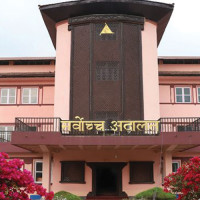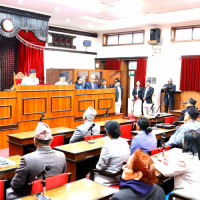- Sunday, 18 January 2026
Climate change blamed for declined bamboo shoot production
By Rabindra Upreti,Bardibas, Sept. 21: The demand for fermented bamboo shoots (Tama), an iconic part of Nepali cuisine and culture, continues to rise. Delicacies made out of fermented bamboo shoots are the speciality of Nepali cuisine, from auspicious celebrations to other rituals.
However, despite the increasing demand, its supply has significantly decreased since the first week of September. Bamboo shoots are not produced year-round.
Business of the fermented bamboo shoots begins in July with August as its peak season in the local market of Bardibas which is organised twice a week-- on Wednesdays and Saturdays. But the supply of the tasty vegetable begins to shrink from September as its production declines from August onwards. However, at the end of September, the customers are still searching for it in the local market while the supply is quite low.
Manju Tamang from Bardibas-10, near the Sindhuli border who sells fermented bamboo shoots at the Bardibas market, said that bamboo shoots have become scarce since the end of August.
This year, about 20 traders from Mahottari and Dhanusha districts were involved in the trade of fermented bamboo shoots in the Bardibas market. During market days, 90 to 100 quintals of the popular vegetable were sold, according to the traders. They estimate that over 220 quintals were sold on the
23 trading days between July’s first week to mid-September in Bardibas.
According to trader Arthaman Waiba from Bardibas-10, Bardanda, this year’s market price for the fermented bamboo shoots was Rs. 100 per kilogram, and on 23 trading days, its transaction was over Rs. 2.1 million.
Waiba said, “Some customers buy up to 30 kilograms at once to send as gifts. On some market days, it was difficult
to meet the demand. Even buyers from across the Indian border come to purchase it.”
In Bardibas, two types of bamboo shoots are sold in two forms—fresh shoots and its fermented pieces. The demand for the fermented pieces always exceeds the fresh shoots, and it was no different this year.
Despite the increasing demand for fermented bamboo shoots for their authentic taste and quality, the effects of climate change have taken a toll on the production, said locals. Manju Tamang and Arthaman Waiba from Bardibas-10, Bardanda said, “Lack of sufficient rainfall in recent years has affected the growth of bamboo shoots.”
Last year, due to a drought, no bamboo shoots sprouted until the first week of July. Despite the better rainfall this year compared to the last year, the amount was still insufficient for optimal bamboo growth, resulting in fewer shoots.
Locals recall that in the past, there used to be more rainfall in the Chure and Bhabar regions compared to the plains of the Tarai. However, over the last decade, the northern areas have seen a substantial decrease in annual rainfall.
Waiba said, “Previously, with heavy rains, bamboo shoots would sprout abundantly from the hillsides to the fields, and we could collect as many bamboo shoots as we wanted. Now it is difficult to gather even a basketful of bamboo shoots.”
Milan Singh from Khairmara-10, Chure, recalled that in the northernmost regions of Khairmara Khola, there were once dense groves of natural bamboo covering an area of about 5 kilometres. However, after the drought of 1982, the bamboo in these groves began flowering, leading to their eventual death. Since then, bamboo production in that area has come to a complete halt.
Similarly, Bir Singh Waiba from Betal village in Bardibas-10, near Sindhuli border, said that inconsistent rainfall has also made the collection of bamboo shoots increasingly difficult. “Previously, bamboo shoots were easy to find near the village, but now, despite the bamboo groves still being there, they do not produce many shoots due to insufficient rainfall,” he said.
According to Waiba, not all bamboo species produce edible shoots. Only certain varieties like “Fosre,” “Dhungre,” and “Chau” bamboo have tasty shoots, while others are bitter. He expressed frustration, saying that frequent droughts and insufficient rainfall have made it challenging to collect the shoots from the bamboo groves.
Botanists explain that rainfall is closely tied to the production of bamboo shoots. The period when shoots sprout is the bamboo’s reproductive phase, during which the plant requires adequate nutrition, which is synthesised through photosynthesis.
Water is essential for photosynthesis and when rainfall is inadequate, the bamboo does not get the necessary nutrients, resulting in fewer shoots emerging, said Ajay Kumar Mishra, the Chief of the Division Forest Office.



-original-thumb.jpg)





-original-thumb.jpg)


-original-thumb.jpg)




